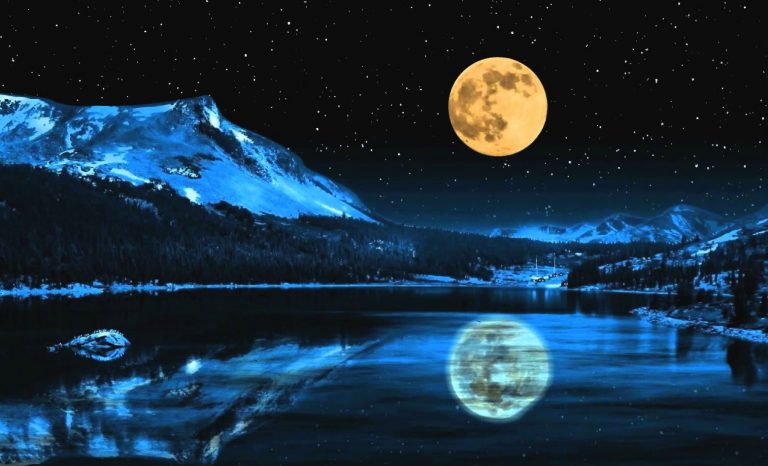
The moon has cast a spell over the human race since the time when we could look up and observe its haunting face shining in the night sky. Shifting, changing, waxing, waning, luminous with a beauty which pierces the heart, it has captured us for as long as history has been recorded, and longer. The righteous Job felt the temptation to worship the moon, though he had the orthodox sense to refuse: “If I have looked at the moon moving in splendour and my heart has been secretly enticed and my mouth has kissed my hand, this also would be an iniquity to be punished by the judges, for I should have been false to God above” (Job 31:26-28). He didn’t kiss his hand and blow the kiss to the moon in adoration, though clearly he felt the temptation.
If Job felt this as a temptation, no wonder most others in his day worshipped the moon as a deity. In 1984, when she was a young child but two years old, my eldest daughter first looked up at the moon’s full face in the night sky and said, “Daddy! Da moon!” She could scarcely pronounce the diphthong “th”, but like the rest of us she had been captured by that haunting orb, and her own heart, not yet even three summers old, had been pierced by a beauty the earth could not afford, a beauty found only found in the heavens. Modern poets, like lovers in every generation, found that when they thought of swooning over their true love in June, it was always under the moon. The moon was not just a rock orbiting the earth as it orbited the sun. It was a goddess, an image of celestial beauty, an ineffable longing, an unattainable desire. When Solomon searched for an image to describe his true love, he spoke of her as “fair as the moon, bright as the sun, terrible as an army with banners” (Songs 6:10). Note: the sun might be bright, but it was the moon that was fair. Such painful beauty did not shine during the day. The sun might give life; but it was the moon that provided a beauty which could pierce the heart and transfigure the world. And (‘fess up, guys), what man does not catch sight of the full moon peaking shyly through the clouds and not be irresistibly reminded of his own true love?
In 1975, at the height of the Jesus People Movement, Barry McGuire (of “Eve of Destruction” fame) gave a concert with other Jesus People singers. At this concert, he said the following: “A brother in the band was reading in the Word one morning, and he was getting all excited…He said, ‘It says here, “He set the sun to rule the day, and He put a lesser light, the moon, to rule the night.” That’s like us, man. When it’s night-time you can’t see the sun because it’s dark out. That’s the way it is in the world with people who don’t know God. They can’t see God, because they’re living in darkness. But they can see the reflection of God shining through the lives of His people.’ He said, “We’re like the moon.’” Barry got it right away. He responded, “O Lord, I want to be a full moon!”
I never appreciated until I became Orthodox how wonderfully exceptional it was for an American Protestant Christian in the Jesus People Movement to interpret the Scriptures in a way that would have done proud any Byzantine Christian trained in the allegorical method exemplified by Origen and his Alexandrian followers. Jesus People were schooled and drilled in rejecting anything but the plain, literal, and surface meaning of the Scriptures, but here was a brother in the band mining the Genesis creation stories for its inner spiritual meaning. For him the moon was not a hunk of rock orbiting the earth. It was an image of God’s people, shining with a reflected glory, a divine light that came from God and illumining those in the world who could not bear the direct intensity of His glory. Flesh and blood had not revealed this to that brother in the band, but his Father who was in heaven.
As it turns out, the beguiling, seducing, haunting beauty of the moon which has captivated generations since the world began calls us to imitate that divine beauty. The world may not be able to see the beauty of God reflected in His creation. For multitudes living the world who don’t know God, a forest is just a forest, and they literally cannot see the forest for the trees. The stars are just balls of gas, burning in the heavens, the sea is just countless gallons of salt water, and Science has killed Poetry. Fact has trampled on the face of Beauty, and the heavens no longer declare the glory of God. They cannot see the glory of God in His world. But they can still see us. We need to reflect the divine beauty, and by our lives of kindness, compassion, and heroic sacrifice for the truth, become the reflected glory of God in the world. In 2017, as you may have noticed, it’s very dark out. People cannot see God, because they’re living in darkness. But they can still see the moon, and be illumined by its reflected light. We’re like the moon. May we be a full moon, and may God’s ineffable beauty capture the world through us, and save the world.
